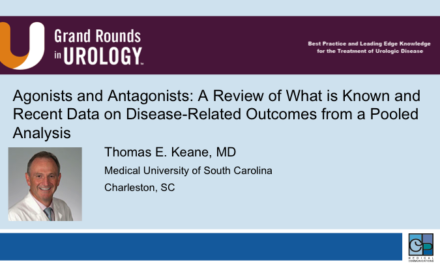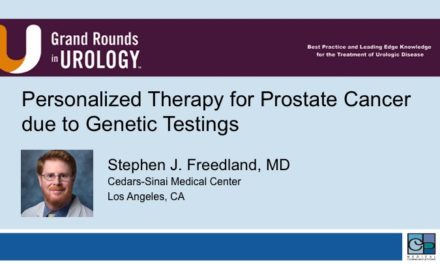Timothy C. Brand, MD, FACS, presented “There is a Role for Currently Available Biomarkers: Genomics in the Risk Stratification of Prostate Cancer” during the 27th Annual Perspectives in Urology: Point Counterpoint on November 9, 2018 in Scottsdale, Arizona.
How to cite: Brand, Timothy C. “There is a Role for Currently Available Biomarkers: Genomics in the Risk Stratification of Prostate Cancer” November 9, 2018. Accessed Dec 2024. https://dev.grandroundsinurology.com/there-is-a-role-for-currently-available-biomarkers-genomics-in-the-risk-stratification-of-prostate-cancer/
There is a Role for Currently Available Biomarkers: Genomics in the Risk Stratification of Prostate Cancer – Summary:
Timothy C. Brand, MD, FACS, argues that biomarkers and genomics have a role in the clinical decision-making process for individual patients with low- and favorable intermediate-risk prostate cancer. He also reviews the literature validating the risk stratification utility of recommended biomarkers.
This presentation is part of a Point-Counterpoint debate. Watch the rebuttal: “Biomarkers in Localized Prostate Cancer: Sure You Can, But Why Would You?” by Alan H. Bryce MD.
Abstract:
Risk stratification is essential when treating prostate cancer, primarily because it equips clinicians to determine if a patient should continue active surveillance or treatment. Additionally, risk stratification helps to guide decisions regarding node dissections, neoadjuvant hormone therapy, and adjuvant radiotherapy.
Without biomarkers or genomics, clinicians have the patient’s PSA level, prostate exam results, Gleason score, percent of cores positive, and a variety of nomograms at their disposal for risk-stratifying patients. However, biomarkers can help reduce clinical indecisiveness in complex cases of low- and favorable intermediate-risk prostate cancer.
For patients in this risk category whose life expectancy is 10 years or longer, the National Comprehensive Cancer Network (NCCN) guidelines recommend considering molecular testing the tumor. The NCCN lists four options for biomarkers in this space, namely Oncotype DX, Prolaris, Decipher, and Promark.
This presentation reviews validation and clinical utility studies for these biomarkers. Overall, the data shows these biomarkers add predictive value to other risk assessment tools and relatively increase active surveillance candidates.
About Perspectives in Urology: Point Counterpoint
Perspectives in Urology: Point Counterpoint (PCP) is an annual CME-accredited conference devoted to discussing and debating the latest topics in men’s health, general urology, and genitourinary cancers. The conference’s format includes more than didactic lectures. It also includes debates, point-counterpoint discussion panels, and unique case-based presentations. Dr. Brand presented this lecture during the 27th PCP in 2018. Please visit this page in order to register for future PCP meetings.
ABOUT THE AUTHOR
Timothy C. Brand, MD, FACS, is a urologist with Baptist Health Care in Pensacola, Florida. He was the Director of the Urology Residency at Madigan Army Medical Center in Tacoma, Washington, for 10 years, and has served as the Urology Consultant to the US Army Surgeon General. He specializes in robotic-assisted surgery for urologic malignancies. Education and research are his priorities. He was President of the Biomedical Engineering Honor Society at Tulane University in New Orleans, Louisiana, where he received his engineering degree. Additionally, he completed a Master’s of Science in Clinical Investigation, and has used this expertise to fuel a career in robotic surgery, resident education, and research. Dr. Brand has received numerous honors, including Board Certification in Urology, Society of Urologic Oncology membership, admission to the American College of Surgeons, a Meritorious Service Medal for the education of Army surgeons on the robotic surgical platform, and several award-winning research presentations. His research includes looking at standardizing curricula and certification for robotic-assisted surgery, surgical simulation, and assessing how oncologic outcomes after intervention for urologic malignancies are affected by pretreatment clinical characteristics.






